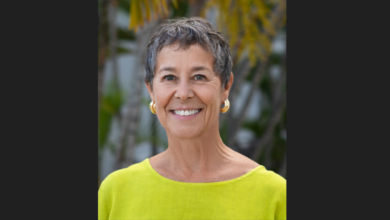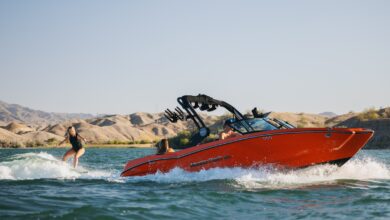Capital matters
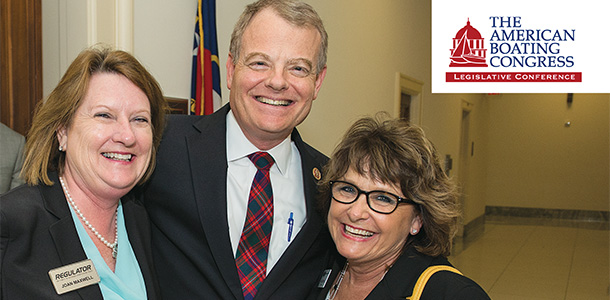
The boating industry heads to Washington for ABC 2014
One of the best opportunities for the marine industry to affect public policy is coming up next month in Washington, D.C.
This year’s American Boating Congress will be May 5-7 at the Liaison Capitol Hill, just a short walk from the Capitol. ABC gives industry stakeholders an opportunity to not only learn about the key policy issues affecting the industry, but also to help shape the debate by meeting face-to-face with elected officials, congressional staff and policymakers. ABC is organized by the National Marine Manufacturers Association and co-hosted by 36 industry organizations, including Boating Industry.
“We’ve made, especially in the last few years, an effort to make it a more inclusive event, so it’s not just about manufacturing,” said Nicole Vasilaros, NMMA’s director of regulatory and legal affairs. “It’s really the opportunity for the entire industry to get together with one voice.”
ABC essentially consists of two parts: a conference to discuss key policy issues facing the industry and visits to Capitol Hill to lobby elected officials and other policymakers on those issues.
The final agenda and speaker lineup hasn’t been set yet, but attendees can expect several of the major issues from access to ethanol to be topics of discussion at the conference. Last year’s speakers were a mix of elected officials and policy experts, including former vice presidential nominee Rep. Paul Ryan, R-Wis.; Rear Admiral Dean Lee of the U.S. Coast Guard and Kenneth Walsh, U.S. News & World Report’s White House correspondent.
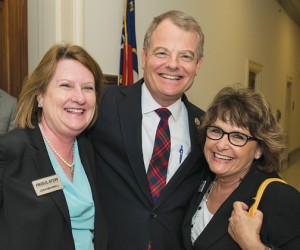
Carroll of Grady-White (right) after their Hill visit with Rep. Mike McIntyre, R-N.C., at ABC 2013.
While government relations staff at NMMA, the Marine Retailers Association of the Americas and other groups and companies lobby on behalf of the industry throughout the year, nothing compares to the impact a local business can have.
Face-to-face meetings with elected officials or congressional staff help put a local face to industry issues. Simply explaining who you are, how many people you employ and why the issues matter can be a powerful message, said Jeff Gabriel, NMMA’s legislative counsel.
A large attendance for the Hill visits and conference also help show the breadth and depth of the industry.
“I think it’s lost on people a lot of times that it’s really in their best interest to take some time out of the year,” Gabriel said. “Having all of the groups together that have to breathe the same air: the manufacturers, the dealers, the boaters themselves … it’s worth being in the nation’s capital to show policymakers this unified voice of the boating industry.”
There are plenty of reasons to be unhappy with our nation’s lawmakers, but not engaging in the process just ends up hurting the boating industry. The only way to be sure the industry’s voice is heard is to be involved, Gabriel said.
“Maybe people don’t think they can effect change. Maybe they don’t like the politicians, maybe they don’t like what’s going on in Washington, but if we do nothing, if we don’t meet with the policymakers, they’re definitely not going to know who we are,” he said. “They’re definitely going to have our opponents painting their picture of us and really it’s our responsibility to paint our picture for ourselves, and what we bring to the table and what we need from policymakers.”
The ethanol issue is a perfect example of that. While the marine industry and affiliated groups have made good progress on the E15 issue, ethanol proponents are well-organized and well-funded. Through a mix of lobbying and grassroots efforts, the ethanol industry is doing a great job delivering its message to Congress and regulators. The marine industry has to do the same, Gabriel said.
New at ABC 2014
In response to feedback from past attendees, organizers have also made some changes to this year’s program. To give attendees more opportunities for industry networking, ABC 2014 will kick off with an opening reception on the Potomac.
Recognizing that the attendees aren’t professional lobbyists, NMMA government relations staff will also be offering more guidance for attendees on making their case during hill visits. Before ABC, attendees can attend a webinar on key issues, and at the conference there will be an all-new session on effective lobbying techniques.
The seminar will help people understand the lobbying process, understand the environment, and what they should expect from their Hill visit. Staff will offer guidance on how to speak to a member of Congress or senior staffer. That will be followed by an issues briefing to help attendees learn the issues and key talking points.
This year’s ABC will also be made a little easier with a new app being developed by NMMA to improve scheduling and feedback.
The app is being created by Beekeeper Group, a company that has developed similar apps for other organizations to manage their government conferences. The app is free to download and use and will be available in the Apple and Google stores by April.
Some of the highlights of the app and service:
• Live training and tutorials. Beekeeper staff will present at the conference on how to download and use the app, as well as provide a one-page handout.
• Instant meeting feedback. With the survey button, users can provide NMMA staff with feedback on Hill meetings: Who they met with, notes, successes, concerns, etc.
• Overall organization and efficiency. The app provides an “in your pocket” conference agenda, maps, talking points and even state-by-state boating figures, helping ensure that no attendee is unprepared, lost or late.
Navigating the Hill and the issues can make attendees nervous. The new app will help to address that, Vasilaros said.
“This will make it a lot easier for attendees to know their schedule, know their talking points, know about the issues,” she said. “Our goal is to ease the anxiety of our members, help them stay focused.”
The real-time survey results will also make it easier to respond to attendee feedback immediately after Hill visits instead of waiting for paper surveys to come back.
“We’ll be able to move much more quickly,” Gabriel said. “It helps us direct our bullets and help the member make a real difference.”
New report highlights industry saltwater vision
One of the biggest issues facing the marine industry is access to water, especially saltwater fisheries.
The industry took a big step forward on the issue at this year’s Miami International Boat Show, when the Commission on Saltwater Recreational Fisheries introduced a new report, “A Vision for Managing America’s Saltwater Recreational Fisheries.”
The report lays out the current state of recreational fishing, the economic impact of it and recommendations for the future.
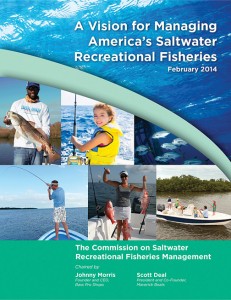 “It’s the first time the recreational fishing industry has gotten together,” said Maverick Boats President Scott Deal during the announcement of the report at the show. Deal, along with Bass Pro Shops founder and CEO Johnny Morris, chaired the commission.
“It’s the first time the recreational fishing industry has gotten together,” said Maverick Boats President Scott Deal during the announcement of the report at the show. Deal, along with Bass Pro Shops founder and CEO Johnny Morris, chaired the commission.
“For many reasons, I’m deeply committed to protecting and enhancing our nation’s fisheries to ensure a bright future for the great American tradition of fishing. It’s not only vitally important to our economy, it’s also very important to our society and for getting kids connected to the outdoors and understanding the need for conservation,” said Morris. “Sharing our outdoor heritage with our children and grandchildren means we must work hard now to improve saltwater recreational fisheries management.”
The commission is composed of biologists, economists, conservationists, fisheries managers and policy makers. The report is especially timely as Congress debates the reauthorization of the Magnuson-Stevens Fishery Conservation and Management Act, which governs the nation’s marine fisheries.
Throughout 2013, members of the commission met to deliberate and debate strategies to improve saltwater recreational fisheries management. A wide range of experts and other stakeholders, including economists, researchers, federal and state agency administrators, environmentalists, charter captains and individual recreational anglers, were invited to meet with the commission to provide information and advice on a variety of fisheries management issues.
The report identifies six key policies that would achieve the commission’s vision. Those recommendations primarily focus on the Magnuson-Stevens Act.
The recommendations include:
• Establishing a national policy for recreational fishing
• Adopting a revised approach to saltwater recreational fisheries management
• Allocating marine fisheries for the greatest benefit to the nation
• Creating reasonable latitude in stock rebuilding timelines
• Codifying a process for cooperative management
• Managing for the forage base
“It’s an honor to participate in the commission’s work and in the development of this landmark document,” said Deal. “This is the first time the recreational fishing community and the fishing and boating industries have clearly set forth what we believe the majority of the nation’s recreational anglers want regarding our saltwater fisheries laws, management policies and regulations.”
Other groups that contributed to the report include the American Sportfishing Association, Association of Fish and Wildlife Agencies, Berkley Conservation Institute, Center for Coastal Conservation, Coastal Conservation Association, Congressional Sportsmen’s Foundation, National Marine Manufacturers Association and Theodore Roosevelt Conservation Partnership.
A PDF of the full report is available at http://bit.ly/bi414.

